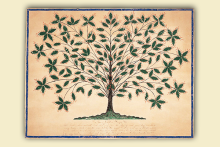Arts & Culture

Released five years ago, Kristin Kobes Du Mez’s Jesus and John Wayne: How White Evangelicals Corrupted a Faith and Fractured a Nation is no orindary history book. Since it published, the treatise on militant Christian masculinity has shaped conversations about Trumpism in both Christian and secular spaces. A surprise New York Times bestseller, the book resonated with many readers who found that it clarified their own experiences of growing up in the American evangelical subculture — and it drew criticism from others who found it to be an unfair takedown of conservative Christianity.
Now, it has a theme song.

Divine Love
Loved Into Being is a tender five-part film series inviting us to rediscover our belovedness in God. James Finley — who was mentored by Thomas Merton — explores how “the divinity that shines forth out of broken places” can heal our wounds and reimagine community. The Work of the People

I’VE SPENT MOST of my life explaining to people why movies and TV shows are more than just a way to pass time. My favorite screen stories — serial or cinematic — help me connect with their creators or the depicted characters. Narratives help us make sense of our experiences and recognize ways we can help others consider their own. Jesus knew this when he told parables, using stories to communicate some of his most important teachings on how we should live generously and faithfully.
A sci-fi series about a robot who struggles to relate to human beings may seem an unlikely example of how good storytelling helps us walk through the world. But that’s what the Apple TV+ show Murderbot offers.

MELANIE R. HILL’S Colored Women Sittin’ on High is a love letter to Black women preachers. “From the cradle, I was surrounded by Black women preachers,” she writes. “Black women who prayed, Black women who preached and prayed, Black women who laid their hands on me and prophesied a destiny full of hope and fulfilled dreams.” For Hill, womanist sermonic practice isn’t confined to just the pulpit. These preachers include the aunts and grandmothers, artists and activists who have “created a healing and restorative space beyond the four walls of the church for the surrounding community and region.”
Hill, an assistant professor of both global racial justice and American literature at Rutgers, utilizes Alice Walker’s definition of womanism as laid out in In Search of Our Mothers’ Gardens, focusing closely on how womanists are “committed to survival and wholeness of entire people.” She addresses the ways that womanism and Black women’s literature have informed the work of Black women preachers, attending to their voices in what she terms “womanist sermonic practice.” Through this practice, Black women preachers demonstrate how to love ourselves and the Black bodies that we inhabit and how to love others and fight against systems of oppression.

MICHAEL ALBERTUS’ THESIS is both simple and grand: “Land is power.” From the earliest settlements of Mesopotamia to the land reforms of Communist China, Albertus insists that control of land has played a central role in intensifying economic disenfranchisement, ecological destruction, and racial and gender inequality. Too often, a minority has centralized land to plunder for resources, no matter the cost.
In Land Power, Albertus, a professor of political science at the University of Chicago, calls the past two centuries of large social redistributions of land the “Great Reshuffle.” These transformations, which continue today, have taken various forms.

SHORTLY AFTER THE Vatican announced that Cardinal Robert Francis Prevost, a Chicago native, would be the next pope, the Cubs changed the iconic Wrigley Field sign to read, “Hey, Chicago, He’s a Cubs fan!” Then Pope Leo’s brother John refuted the claim. Apparently, Leo loves the White Sox, which is convenient, given that their colors more closely match the papal vestments. While this revelation is a big loss for the Cubs (they’re used to that, fortunately), it’s still a huge win for the city of Chicago. In June, Chicagoans (even Cubs fans!) swarmed to the White Sox’ Rate Field to hear Pope Leo address his hometown’s faithful via Jumbotron in what Chicago Cardinal Blase J. Cupich called “the sermon on the mound.”
Clearly, the new pope’s love of the Windy City runs deep, so we’ve put together a list of hometown facts about Pope Leo (Chicago Man) XIV. While all unverified by the Vatican, some truth could be hidden here. Stranger things have happened: a man on the moon, an American in the popemobile.

In 2002, director Danny Boyle and screenwriter Alex Garland released a post-apocalyptic horror movie that would redefine the zombie genre forever. 28 Days Later was not only ambitious for its experimental cinematography and reliance on relatively obscure actors, but also because of its critical commentary on violence and militarism. Boyle and Garland have partnered up again for the newest installment in the 28 Days Later film series, with the release 28 Years Later (now playing in theaters).
There’s nothing wrong with a gross and scary zombie movie that just stops there, but the 28 Days Later film series offers more than jump scares and blood-barfing, fast-moving zombies, which are called “infected” in the films.

MORE THAN FIVE decades ago, two young Brits with dreams of writing musicals came up with the audacious idea of a rock opera about the Passion of Jesus Christ, told from the point of view of Jesus’ betrayer, Judas Iscariot. From the very moment composer Andrew Lloyd Webber and songwriter Tim Rice proposed it, Jesus Christ Superstar provoked both adulation and condemnation. And five decades have done nothing to diminish either the show’s fire or the intensity of audience reactions.
In August, the Hollywood Bowl will host the musical with another innovative twist: Wicked’s Cynthia Erivo plays Jesus and rock star Adam Lambert takes on Judas, in a one-weekend-only production directed by Tony and Emmy Award winner Sergio Trujillo. Some have already condemned the production for giving a queer Black woman the role of Jesus, decrying it as “intentionally blasphemous” — a complaint that has been made about various aspects of the show (including its casting) from the beginning. But the show’s actual history reveals that Superstar has been anything but a blight upon Christianity. Generations of artists have found within it fertile ground to reflect on faith and justice, sacrifice and society.

IN MAY, THE Schomburg Center for Research in Black Culture, located in Harlem, N.Y., celebrated its 100th anniversary. Originally known as the 135th Street Branch Library Division of Negro Literature, History and Prints, it is named after Arturo Schomburg, a Black Puerto Rican from Santurce, Puerto Rico. He moved to New York City when he was 17 and is widely considered one of the great luminaries of the Harlem Renaissance.
Schomburg recalled an encounter with his fifth grade teacher, who told him, “Black people have no history, no heroes, no great moments.” That moment left an indelible mark. He would go on to dedicate his life to collecting artifacts, papers, and works of art from Africa and across the African diaspora. In his seminal essay, “The Negro Digs Up His Past,” Schomburg referred to his 10,000-item collection as “vindicating evidences.”
Since learning about Schomburg, I have reflected on how, as a Latino, Schomburg could have chosen to suppress the story of his own Blackness. Instead, he embraced his full Puerto Rican identity, Blackness and all.


Sojourners spoke with DeBlois about the film’s relevancy, the importance of wonder in the creative process, and filmmaking as an act of faith.

Celine Song is just two films into her career, but she’s already established herself as a storyteller who infuses the tumult of modern love with ancient wisdom, and a kind of transcendence that breathes poetry into a disenchanted world.

“Inside the soul of this accountant who loves his job and loves his wife and loves his son, is this dancer,” Hiddleston said during a press conference. “And that might be true of anyone you know or anyone you see on the street … Inside that human being is greater breadth and depth and range than we could possibly imagine.”

L’Arche challenges the notion that a group home is predominantly a place to provide care services. We have learned over time that the health of our community is rooted in how we gather, celebrate, and make known the unique gifts of every person. This does not diminish the work of competent caregiving, but rather, it places it in a larger context that recognizes how ritual and gathering emphasize a person’s gifts and beauty rather than their diagnoses.

Kendrick Lamar is a prophet — and a multimillionaire. Through his music, he tells the stories of the oppressed and marginalized, even as his own net worth surpasses $140 million. He calls for spiritual and political resistance to empire yet stood center stage at the Super Bowl halftime show — America’s most-watched spectacle of capitalist excess. At the end of it, he delivered a moment of rebellion, urging viewers to “turn the TV off,” subverting the very platform that elevated him. And yet, the performance also propelled his music sales and deepened his entrenchment within the industry’s elite. At a sold-out Pop Out show, he brought together feuding Bloods and Crips in a powerful gesture of peace and unity — sponsored, ironically, by Amazon, a corporation widely criticized for its union-busting, exploitative labor practices, and surveillance capitalism.

Leckey's lyrics are soaked in Catholic tradition. When writing songs on Hell Gate, Leckey asked herself: “What if I just full-send it with the Catholic terminology and imagery and tradition, and just do my own thing with it? I think of it as a reclamation and a repurposing.”

Isaac Villegas' evocative book opens in the Southwest desert along the borderlands of the U.S. and Mexico as a group of people leave crosses in the places where migrants have lost their lives. These crosses, writes Villegas, are “...an act of devotion to a stranger who should have been our neighbor… Each crucifix remembers a life lost to the violence of immigration policies.

THIS SPRING, MY family and I were discussing what artistic representations of Jesus’ life have shaped our spiritual lives. For one son-in-law, it was Mel Gibson’s The Passion of the Christ, though he noted it is quite violent. For my husband and our adult kids, it was Jesus Christ Superstar. For me, it was seeing “Godspell” in Toronto in 1972 when I was 12. I vividly remember the wide-open energy that kept inviting new disciples into the group of Jesus’ followers, the circus-like performers bursting with enthusiasm, encouraging each other to creatively express what they were discovering together. It was physical, passionate, musical, hilarious. I looked up the musical’s history and discovered that my spirituality was shaped by legends of improv comedy, including Gilda Radner and Martin Short, who went on to be cast members of Saturday Night Live, and Eugene Levy, whose storied career continued this century in Schitt’s Creek.
Perhaps that early spiritual orientation toward freewheeling motion, fun, community inclusion, live performance, and humor is why I appreciate theologian and author Henri Nouwen’s efforts to image our spiritual lives as daring, interdependent trapeze acts.

“ON EARTH AS it is in heaven,” wasn’t simply a prayer for the Shakers, a small Protestant sect that practiced communal living and peaked in the mid-19th century: It was the bedrock of their lives. In the mid-1800s, Shaker Sarah Bates depicted this collision of heaven with earth in “Wings of Holy Wisdom, Wings of the Heavenly Father.” In cobalt and inky blues, she drew churning stars and slivered moons, holy scrolls and books cracked open by birds, God’s hand reaching through dark heavens, trumpets and swords among unfurling flowers.
The United Society of Believers in Christ’s Second Coming originated in England in 1747 and were guided to America in 1774 by Mother Ann Lee, an illiterate factory worker who became the community’s charismatic leader. Their ecstatic dancing during worship led some to call them “shaking Quakers,” later shortened to “Shakers.” Lee preached ideals such as pacifism and gender and racial equality, and in the new communities in America, she introduced celibacy and no private property. Lee was persecuted and imprisoned for her beliefs, and among many Shakers, she was considered the second coming of Christ in female form.
From about 1837 to 1857, some Shakers began receiving images and messages — many believed to come from Holy Mother Wisdom, who the Shakers saw as the “personified feminine” aspect of God along with the “Almighty Father” as the masculine personification, art historian Sally Promey wrote in her book Spiritual Spectacles. Some people believed the messages came from departed loved ones, and they recorded them in paintings, dances, songs, drawings, and spirit writings, in which a scribe would capture characters and designs that looked like words and letters but whose meaning was unknown — kind of like a “visual equiva-lent for speaking in tongues,” Promey wrote. This period was known as the Era of Manifestations or “Mother’s Work.”
The “gift drawings” of that era burst with geometrical shapes, holy symbols, and heaps of color. The creators of the gift drawings called themselves “instruments,” not artists, and most were women and young people — typically “the least powerful members of Shaker society,” Promey wrote.

When a Child Sees War
Adapted from Alexandra Fuller’s memoir, Don’t Let’s Go to the Dogs Tonight centers 8-year-old Bobo’s life on her white family’s farm in what is now Zimbabwe at the end of the wars for independence and racial equality. We see both sides of the war through Bobo’s eyes. Sony Pictures Classic